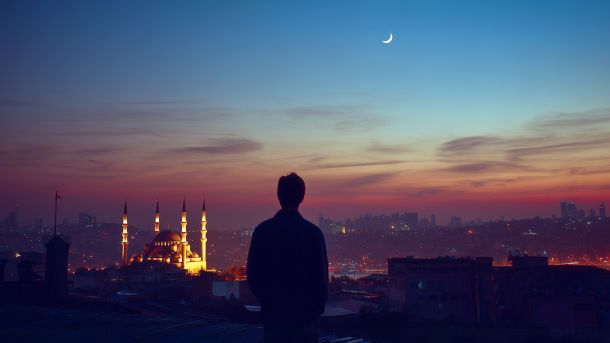The Perfect Man (2)

In This Article
-
When people enter the perfect man’s aura, they begin to feel the breezes of friendship with God, and on reaching that door, they quiver with calls from the realms beyond.
-
A human being is indicative of the Divine Being as His work of Art, while his or her attributes are indicative of the Divine Ones as they are dependent on them.
-
It is not possible to have a perfect knowledge of God without considering existence as far as its beginning or seed is concerned, or without turning to the horizon of the universal man, who is a comprehensive voice of the Divine Being, Attributes, Names, and Acts.
The perfect, universal man is a polished mirror for the Ultimate Truth and, in his relation to other beings, is like a star which stands still in its place or rotates around itself, and around which satellites turn. While rotating around himself, he flies around his axis in utmost devotion to Him and, as stated in the verse (16:16), And (many other) way-marks, and they find their way by the stars, he guides others to the straight path and directs them along it. Like a compass, he causes others to find their direction, and like a door or window he shows others the truth, and like a bridge he makes others pass from the darkness of their own world into the spacious world of eternity. When people enter his aura, they begin to feel the breezes of friendship with God; on reaching that door, they quiver with calls from the realms beyond, and on crossing that bridge, they rise to the horizon of having a relationship that consists of worshipping servants and the Sole Object of Worship with the Unique, Eternally Besought One in the perfect manner.
This horizon signifies God’s Throne (of absolute dominion over all things) in the universal sphere with respect to His manifestation of all His Names throughout the universe, and the human heart (which corresponds to God’s Throne) in the particular sphere with respect to His manifestation of His particular Names on particular things. The most important food of the travelers to this horizon is maintaining the purification of their hearts, and hunting the special Divine gifts and favors in prostration on their rugs in the mysterious world of nights that are regarded as blessed times when no one sees us. Concerning this, Ibrahim Haqqi says:
The heart is the home of God;
purify it of whatever is there other than Him,
so that the All-Merciful may descend into His palace at nights.
Mawlana also has something beautiful to say concerning the corridor or spiral of nights which extends to the Hidden Treasure:
If you seek that peerless Sovereign, and have set out to reach Him,
you should not sleep during that journey.
Good, fortunate ones sleep in the shadow of God’s love and mercy.
O brother, beware that you should not sleep in another place.
We should spend nights, which draw us to deep thoughts and heavenly considerations, in humble devotion by standing, bowing, prostrating, and reciting His Names and making humble petitions to Him.
According to some Sufis, everything has an outward, visible aspect, which is called the outward. This material world is the outward or external world. It has also an inner or inward aspect, which we call the inward. It consists of all metaphysical worlds, including the spiritual ones and the Hereafter. There is another (intermediate) world which has both the inward and outward aspects and which lies between them and the Divine Names, separating the two (outer and inward) worlds from each another. This intermediate world is the world of the universal man. God’s knowledge of Himself is the true, substantial mirror to Himself, and the Divine Being is manifested and known in that mirror beyond all concepts. The knowledge of the universal man is a mirror to himself that is dependent on Divine Knowledge, and he is manifested and known in that mirror of his knowledge. Nevertheless, whatever he has, including his knowledge, is a gift to him and therefore does not belong to him. For this reason, with whatever he has he indicates the One Who has everything absolutely and originally.
With his or her being and attributes, a human being indicates the Divine Being and Attributes in two ways. One is that a human being is indicative of the Divine Being as His work of Art, while his or her attributes are indicative of the Divine Ones as they are dependent on them. The other way is that the restriction and particularity of human nature and its attributes (as humans being created and of relative character) indicate the universality, originality and infinity of the Divine Being and His Attributes (as the Divine Being being the Creator and of absolute character).
It is because of this type of relation with the Divine Being that a traveler who has reached the rank of universal man is considered to have reached the rank of perfect vicegerency of God. Above this rank is the station of “or nearer” that lies between the Necessary and the contingent. The only one who has reached this station and who has represented it throughout the whole of human history is the master of creation, who represents the greatest rank which any mortal being can reach and the (most) perfect manifestation of the Divine Names as concentrated on a single being. He has reached this greatest rank because of his most laudable virtues or matchless excellence in spirituality and morality, the straightforwardness of his acts, the depth of his relations with his Lord, the perfect balance he was able to establish between the affairs of this world and the next, and his determined insistence on penetrating the mysteries of Divinity and creation. The perfection of all other perfected beings is relative when compared to his and is dependent on allegiance and submission to him. All other Prophets and Messengers, who rose in the heavens of humanity, diffused the light only before he honored the world. Pointing to the fact that that greatest being is like the sun and all the other Prophets and Messengers are like its satellites or “stars” which diffuse light only before it rises, Busayri says:
Surely, he is the sun of virtues with others being stars,
giving out light for human beings only when it is night.
As the master of creation, upon him be the most perfect of blessings and salutations, he is both the seed and the fruit of the tree of creation. The tree of creation has always been related with him from the beginning to the end, and has grown in connection with him. More than being the seed and fruit of the tree of creation, he is also its essence and spirit. He can also be viewed as the basic element of the “soup” of existence.
As the basic aim in the creation of the universe,
that most exalted sun came into existence.
The heavens and earth shrank from being a mirror to the abstract nature of Divine Existence, which comprises all of the Divine Names, because they were unable to reflect it. Yet, humanity was endowed with the potential to do this. Thus, humanity was given external (material) existence in order to realize this aim. However, most people are ignorant and are caught up in wrongdoing, in that they cannot fulfill this task of reflection; in order for a human being to not be an ignorant one or a wrongdoer, he or she should be extremely careful, sensitive, and conscious of the responsibility of being a mirror to Him. In other words, a human being will make good the gap of ignorance and wrongdoing in his or her nature by setting his or her mechanism of consciousness to move in harmony with the Divine Revelation, and so change the field of loss into a market of profit. The following Qur’anic verse (33:72) expresses this fundamental task of humanity: We offered the Trust to the heavens and the earth and the mountains, but they declined to bear it, and shrank from it, but humankind undertook it. Surely, (due to many among humankind who fail in observing the Trust,) he has proved to be a wrongdoer, and ignorant.
Nothing in the universe—whether it be the heavens or the earth and the mountains—except humankind has a heart, will-power, consciousness, internal senses, or faculties, all of which are essential to seeing, making others see, and reflecting the greatest truth in existence. They have neither the ability nor physical possibility to represent and reflect that truth. It is only humankind who, by reinforcing and deepening their innate endowment from God by fulfilling their religious responsibilities, can perform this mission. Those among human beings who can do this are saved from ignorance and wrongdoing.
It is true that, in practice, every human being has not been and is not able to succeed in fulfilling this task. But it is also true that there have been and are many who are conscious of the aim of their creation and who improve themselves by fulfilling their religious responsibilities on the way to becoming a universal human being. They develop their potential and knit the laces of eternity to fulfill the Divine purpose for their creation out of belief in God, knowledge and love of Him, yearning, zeal, the feeling of attraction and being attracted toward God, and spiritual pleasures. Those conquerors of hearts who have set up their thrones at the intersection of the worlds, of both this and the next realm, have gained a second, transcendent nature beyond their own, with souls that are extremely alive and active through the breezes of the All-Beloved, and their horizons airy with breezes of friendship with Him. In his enchanting style, Mawlana Rumi depicts these mythical birds of the heaven of perfection as follows:
Heroes of journeying on the way to God are alive
with a soul other than that known soul.
The birds that fly on the air that “emanates” from Him
have nests other than the nests known.
Do not try in vain to see them with those eyes of yours;
with these you cannot see them.
They dwell in another realm beyond both this world and the next.
One can have knowledge of God through His Acts and Names, and the Names are manifested on things and events. Humanity is both the seed and fruit of existence. As for the universal man, he is the essence and spirit of everything. For this reason, it is not possible to have a perfect knowledge of God without considering existence as far as its beginning or seed is concerned, or without turning to the horizon of the universal man, who is a comprehensive voice of the Divine Being, Attributes, Names, and Acts. He is also a pattern of existence that contains all the ranks as he is the final link in the chain of existence. We can therefore say that the Almighty can be known and felt only through the universal man in accordance with His Grandeur and Majesty, and the universal man sees, knows, and holds every-thing by Him and builds relations with others in dependence on Him. The unique, greatest representative and hero of all instances of seeing, knowing, holding, and being in relation is Prophet Muhammad, upon him be peace and blessings, while all other universal men can attain what they will attain only in his footsteps. For the truth he represents—his truth as being Muhammad or the Truth of Muhammad—has its origin in God’s manifestation of all His Names throughout the universe, which comprehends all truths. God—Allah, the proper Name of the Divine Being Which comprises all the Divine Names and Attributes—was his private tutor or Lord, Who brought him up especially. Since the proper Name of the Divine Being—God (Allah)—comprises all the Divine Names and Attributes, the master of creation, upon him be the most perfect of blessings and salutations, is the most polished or brightest mirror to the Divine Essential Qualities and Attributes and Names, as he is the most comprehensive mirror to Him reflecting all His Names and Attributes. The saying, “God is always seen in the mirror of Muhammad,” is a reality. Other universal men, including all the other Messengers and Prophets, have not been and will not be able to receive the same degree of favor, for God bestows His blessing upon him whom He wills (62:4).
Each of the other universal men may have been and may be favored with the manifestation of one or a few Names and At-tributes; the part of each one in the manifestation of each Name and Attribute differs according to his capacity. However great the moons and stars of the heaven of the Prophethood and the sainthood, the capacity of each restricts him. Although each of them has reached and is able to reach the final point of their rising, the final point of each marks either the initial or middle point on the way of the ascension of the most perfect of them, upon him be peace and blessings. Again, even though each has successfully completed their duty, both their mission and their being mirror to God are limited compared to the mission and being mirror of the most perfect of them. As saintly people differ in their knowledge and love of God and in their spiritual pleasures, the ranks of the universal men also differ according to the extent of their being favored with the manifestations of the Divine Names. This is one of the reasons why saintly people, pure scholars of religion, godly ones, and those near-stationed to God may also differ in their views and interpretations concerning the secondary matters of religion, which are open to different interpretations.
The difference of ranks between Messengers and Prophets, which is indicated in (2:253), Those Messengers: some We have exalted above others (in some respects), also arises from the manifestations of the Divine Names in different wavelengths and the degree of each being favored with them. For example, Prophet Adam in the brief or summarized knowledge of all things given to him, Prophets Abraham and Ishmael in the knowledge, forbearance and leniency with which they were favored, and Prophet Jesus in the (spiritual) power with which he was endowed, are higher in degree than others. As for the master of creation, upon him be the most perfect of blessings and salutations, he was honored with the full and detailed manifestations of all the Divine Attributes and Names, and therefore is the highest or most advanced of all in all virtues.
Each universal man is perfect according to his capacity and the effort he exerts to have knowledge of God. All of them have combined in themselves the knowledge of Divine Revelation, scientific and theological, intellectual and spiritual proofs concerning Divine truths, and a knowledge of God in certain degrees. Lacking in one of these would be an important defect or imperfection in the name of perfection. The Qur’an and Sunna (Revelation) are the foundation, reasoning and logic or intellectual activities are the means with which one approaches the goal, and knowledge of God and wisdom are the fruit of walking straightforwardly on the way. The last word:
O ascetic, do not think that everything is finished
with fasting, Prayer and pilgrimage to the Ka’ba;
What is necessary to be a perfect one is knowledge of God and wisdom.
(Niyazi-i Misri)
Our Lord, Our Master, the Goal of our endeavors! I ask You, O God, not to burn me in the Fire! We seek refuge in God from the punishment of the Fire; and we seek refuge in God from all seditions, plain or hidden. And bestow Your blessings and peace on our master Muhammad, the intercessor for our sins, and on his Family and Companions, so long as days and nights continue, afternoons follow each other, the moon reappears after its complete disappearance, and the Farkadan (the two stars b and Ursae Minoris) coincide.









